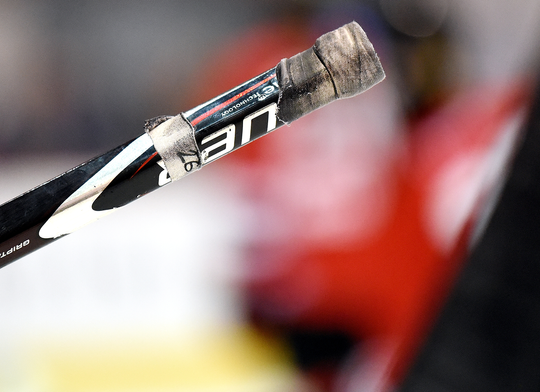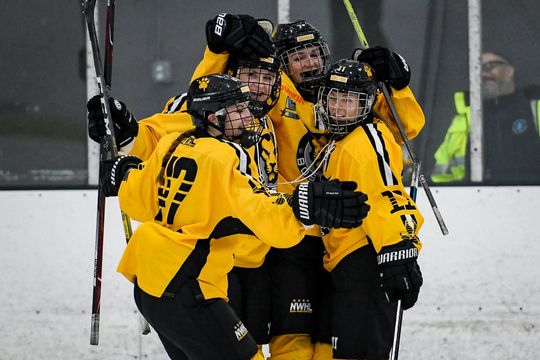In Olympic weightlifting, months upon months of training to prepare for a meet comes down to just a few moments. The motion to get the weight above your head is quick and sudden. In the words of weightlifting coach Michael Reams: "When that bar comes up, you've got less than two-tenths of a second to get under it." Michael and his wife Donna are retired from their day jobs and now spend most of their time coaching lifters, like 17-year-old Celia Huddart. This past weekend on February 20, they were at the Greater Philadelphia Expo Center with Celia and her family, watching the teenager lift a best combined weight of 142kg -- about 313 pounds -- at the USA Weightlifting National Junior Championships.
Celia comes from an athletic family; her mom, Alyssa Royse, owns a Crossfit gym, and Celia became a rower in high school. However, after a back injury sustained during rowing and a long recovery, Celia found weightlifting via Crossfit as she tried to get back into shape. In the 2015 Youth Nationals this past June, she won a silver medal for her 65kg snatch and was ranked fourth overall in the 63kg weight class among 16- and 17-year-olds.
Among kids her own age, Celia is a standout, both on the weightlifting platform and in terms of how she carries herself. She's self-assured, attentive, and focused, but she's also kind of warmly self-deprecating. "I was kind of just doing it for fun and I really didn't think I could qualify for nationals," she said. "I didn't think it was possible at all when [Michael] was talking about it. And as soon as I did qualify, I was like oh -- I guess I can do this."
"You have to be very bright to do it, but that's what kills you. You overthink it," Michael said. Lifting requires an acute awareness of your own body, and while there are no true "style points", technique is important if you want to lift safely and successfully. If you "press out", judges can rule your lift as a miss. Pressing out means that you didn't lift and lock in a single fluid motion -- maybe you bent your arms before straightening out to hold the bar above your head. If you want the lift to count, it does have to be clean, even if you're fighting it and even if it isn't pretty.
The basics, if you don't know them: there are two lifts -- the snatch and the clean & jerk. Each weightlifter gets three attempts at each lift, increasing their weight after a successful lift by at least 1kg. The combination of their highest successful weight lifts is their total; if a lifter fails to successfully complete a lift in either category, they fail to total. If two totals are equal, the lifter with the lower body weight is ranked higher (and yes, this can get down to the hundredths of a kilogram). Competition is defined by weight class, and USA Weightlifting holds competitions for both youth lifters (17-and-under) and junior lifters (20-and-under). The senior level includes weightlifters of all ages who can lift the qualifying weights.
Celia's silver medal performance at Youth Nationals qualified her for the Junior Championships, meaning that while she would be in the same weight class (between 58 and 63kg), she would be lifting with girls who were up to three years older and nearly ten pounds heavier. Those three years and ten pounds mean a lot in weightlifting.
At the meet, Celia was also lifting in the same weight class as her best friend, Liv Kinkade, who is also 17. Celia and Liv met because Liv followed Celia's mother Alyssa's Crossfit blog, and they've been able to carry on a friendship via iPhone -- Celia lives in the Seattle area, and Liv is a native of West Virginia. The two have an easy, best-friend manner with each other, despite the fact that they've only met in person once before at last year's Youth Nationals in Bloomington, Minnesota. They have so much in common -- both are excellent lifters who are used to being the best at what they do, and both are clearly driven and focused athletes. But they navigate the challenges of competitive weightlifting with a different cadence. Celia has a practical directness about her that results in a kind of constant deadpan -- she's funny, and critical. Liv's tone is a bit lighter, and she's unflinchingly optimistic.
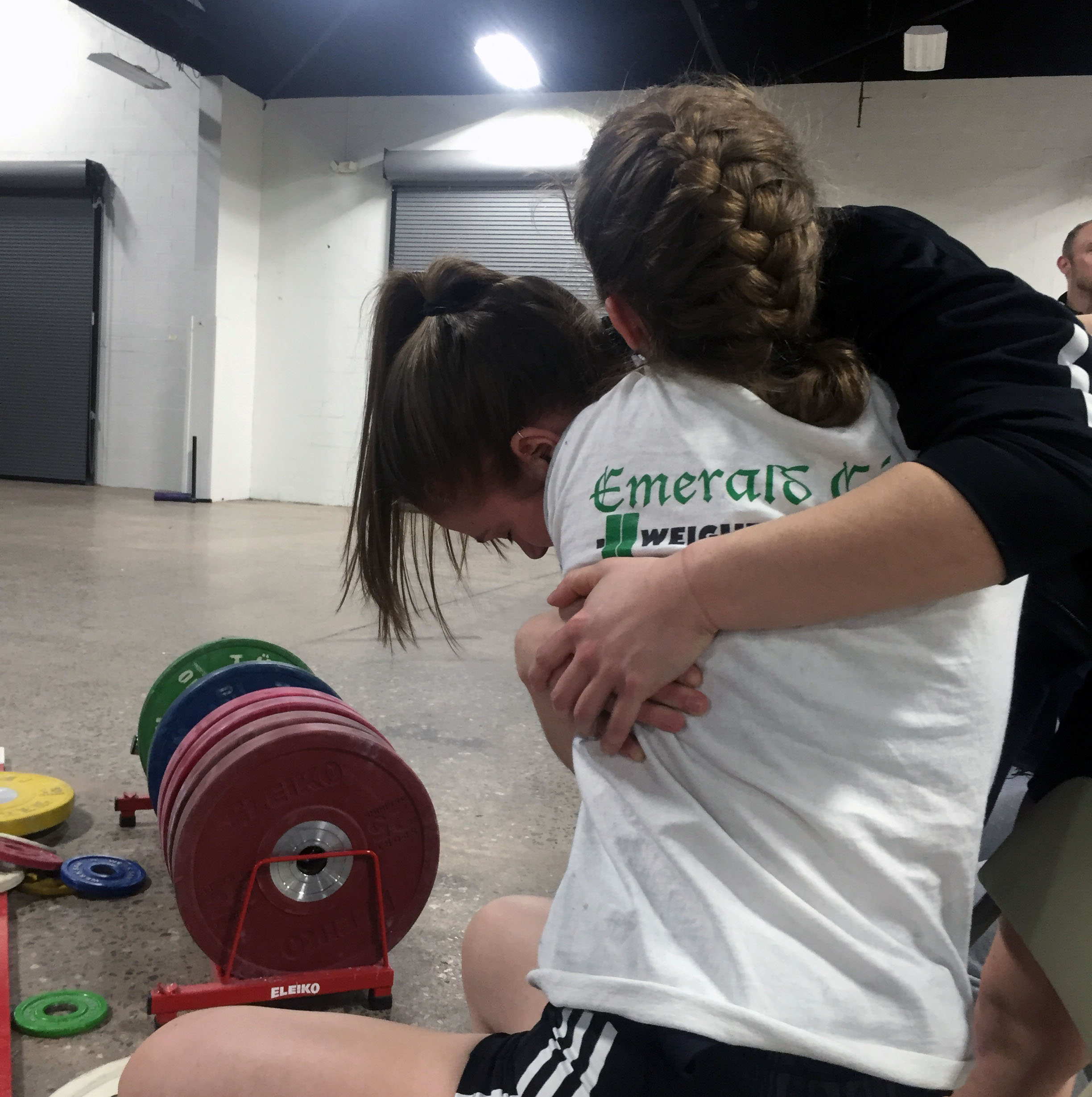
Liv hugs Celia before their weight class takes the platform.
This translates to their personalities on the platform, too -- Celia's movements and facial expressions betray little more than raw power and relieved satisfaction when she can toss the bar down after a successful performance. Liv wears her heart on her sleeve a bit -- she's more likely to flash a smile and laugh after a big lift.
"We clicked right away. We also made the transition to full-time weightlifting right around the same time," Liv said of their friendship via email. "Almost two years later and we're still in nearly 24/7 contact of some sort... Weightlifting and social media/texting has given us the opportunity to build a really unique, but still deeply supportive and loving friendship."
Both girls also described weightlifting as empowering and the community as positive. Alyssa also told me: "I've never heard a lifter bad mouth another lifter. I'm sure it happens, but I haven't heard it yet."
The atmosphere in the Greater Philadelphia Expo Center in Oaks, PA was, for lack of a better description, incredibly chill. There were two stages, one for the men's competition and one for the women's. There was a shared warmup area "backstage", behind the platforms, separated by simple black curtains. Cheering was encouraged, and PA announcers were clear when a lifter was going for a record attempt. Extra encouragement was asked for and cheerfully offered when a lifter was coming back for an attempt after failing at a previous one. I was able to walk freely back to the warmup area and throughout the complex, where folks were unfailingly polite.
Celia and Liv were lifting in the session that began at 4pm, and they were doing official weigh-ins at 2:30. Celia stopped at the check scale around 1:00, weighing in at 58.9kg. She had been eating organic peanut butter to try to add before weigh-in. "Mass moves mass," she said. 58.9 is extremely light for her weight class. The top lifters in this category are all above 62kg, constantly skirting the line of 63kg for the classification, which, I realized, could be incredibly stressful -- Alyssa told me she had seen girls cut off long hair before weigh-in to make weight, because even a fraction of a pound over the limit will disqualify you. Celia's efforts to put on a few tenths of a kilogram were thwarted by the fact that she had to pee around 1:30. At the official weigh-in, despite the peanut butter, she was down to 58.3kg -- by far the smallest lifter in the weight class that day. After weigh-in, she bought an enormous glazed doughnut from the concession (conveniently located right next to the official scales), and savored that while keeping an eye on the clock.
There's no room for body shame in weightlifting -- strength takes all shapes and sizes. "I think the two together, weightlifting and Crossfit, have set what feels to me like a new standard for women, that you're allowed to be strong and you don't have to be skinny and you don't have to be all of these things, which, as the mother of a teenage girl, kicks ass. So you know, we got her through puberty focused on being strong, and doing things, which is really cool," Alyssa told me.
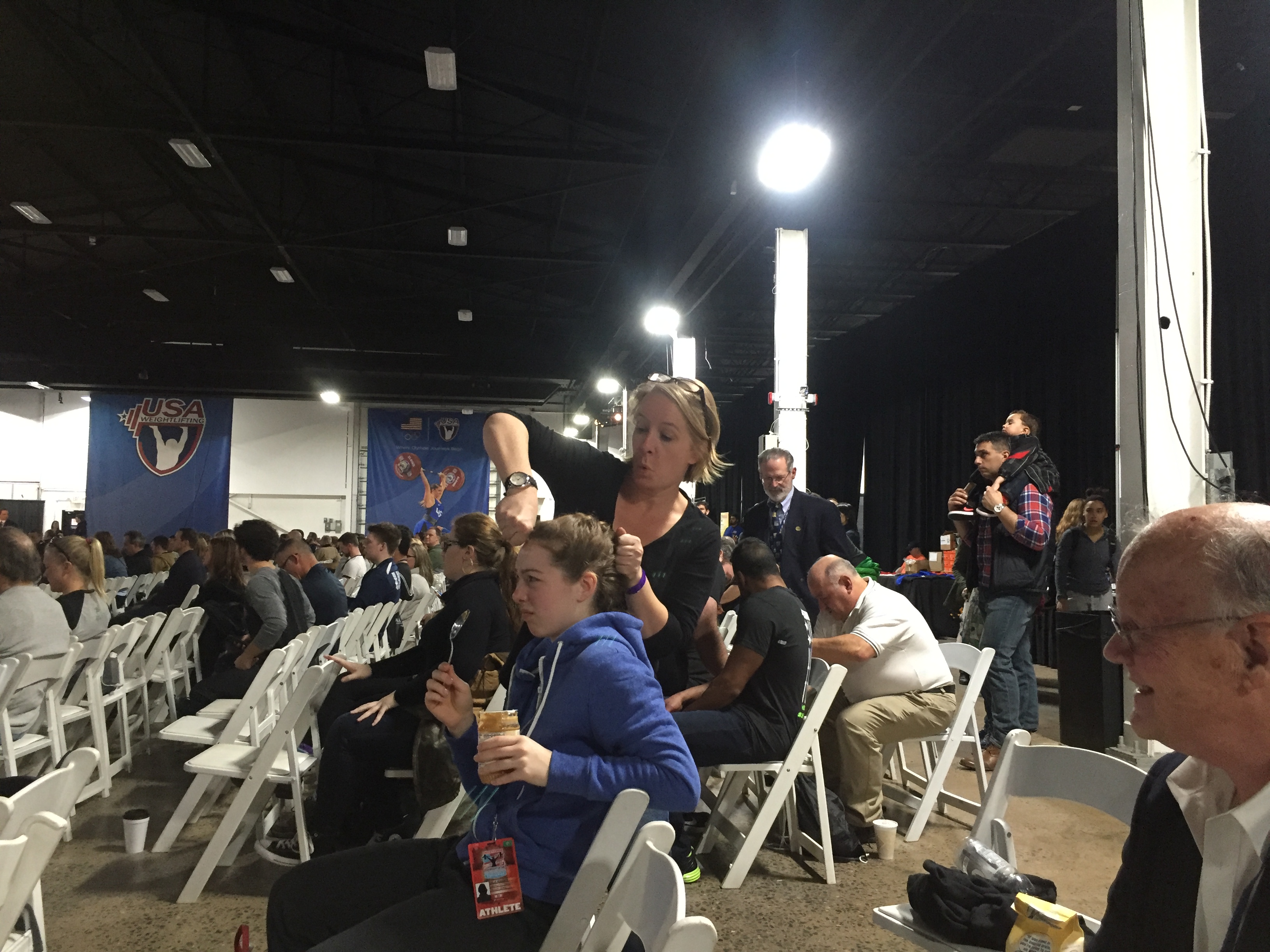
Alyssa pretends to cut her daughter Celia's hair; meanwhile, Celia eats peanut butter as coach Michael Reams looks on.
Backstage before her session, Celia and Liv changed from standard jock lounge wear into their lifting singlets. Celia wears a black singlet and American flag socks; Liv sticks to all black. The snatch came first, then a break, followed by the clean & jerk.
People lifting the lightest weights go first, and then are re-ordered based on their next lift attempt. For example, if a lifter's first attempt is 60kg, and she succeeds, she might make her second attempt at 63kg. Everyone else who is lifting at 60, 61, and 62 will go first, though, with weight constantly being added to the bar, and she'll go later, when called with everyone else who is attempting the 63kg weight. Basically: weight never comes off the bar. It only gets added. They finish with everyone who's lifting at 63 before they move on to 64. And so on. The order is constantly in flux, and it can be confusing, but it's always building towards the heaviest lift attempts.
Celia started her snatch at 61kg on Saturday, though at weigh-in, she'd reported that she'd be starting at 63. Michael took the change to the officials and had to put his signature on it. When I asked if he decided what she would lift each time, he said, "We negotiate a bit." By contrast, Liv and her coach, Guy Hornsby, told me that she often doesn't know how much she will be lifting until just before she does it. He keeps it a secret because if she focuses on the number, she often does not do as well. "I just go out there and do my job," Liv said.
The 61kg snatch went well for Celia, as did her next attempt at 64kg -- she was slow to get up for it, but she fought through it.
Liv ended up starting at 68kg for her snatch -- she seemed to hesitate as she was finalizing her grip on the bar. She lifted it -- and then she dropped it. On her second attempt at 68kg, she managed to get it above her head, but then it flew wildly backwards, and her left arm twisted backwards with it. She left the stage in tears, grasping her elbow, and the clock was reset for 2:00. After about 60 seconds with a member of the medical staff, she came out to attempt it for a third time, and again, she dropped it, failing to have a successful snatch. (Celia topped out at 64 -- she couldn't lift her third attempt at 67.) Backstage, after the snatches were over, Liv had ice on her elbow and told us that she would be out of the rest of the competition so as to not risk more serious injury. "It's fine," she said, still with a wry smile on her face, "Just irritated." To Celia, she said, "But you're still going to kill it."
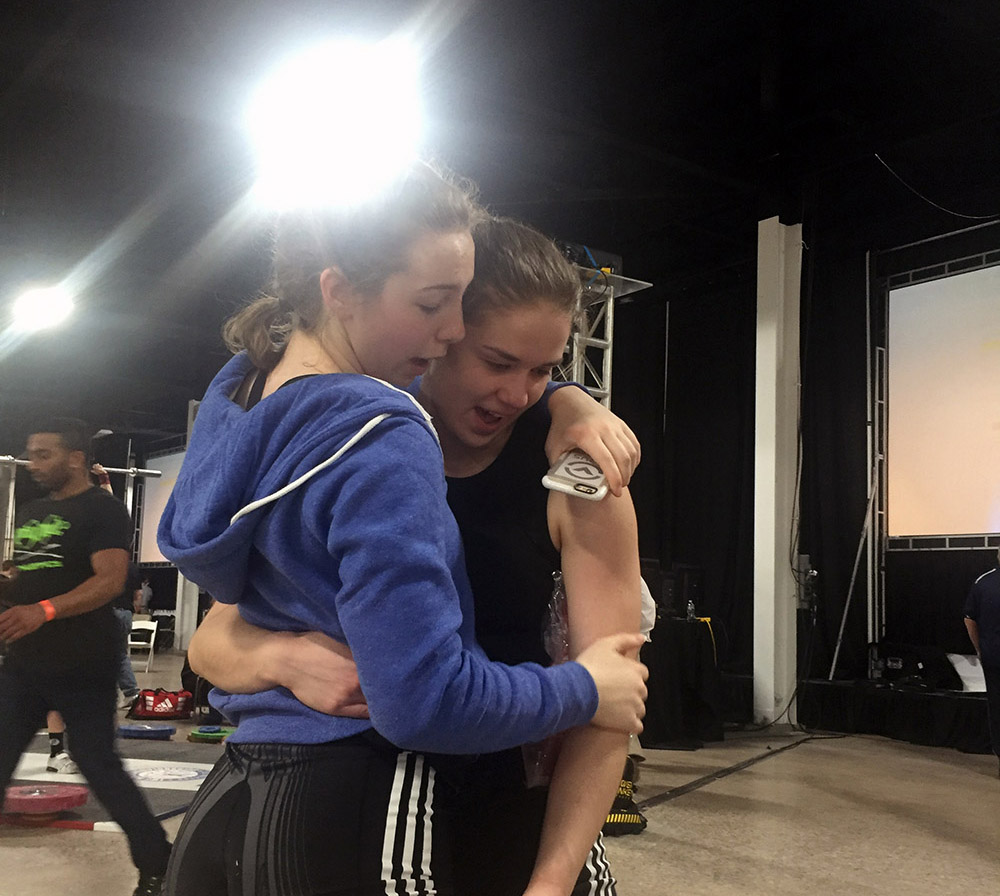
Celia and Liv hug backstage after Liv injures her elbow attempting her snatch.
Celia lifted 75kg to start for her clean & jerk, then 78kg, but failed on her third attempt at 80kg. Despite being the lightest lifter in her weight class, she placed 16th out of 20 lifters that day who totaled.
A few days before the meet, Celia had told me: "I have finally come to the conclusion that I want this to be kind of low profile. I came out the gates really quickly at Youth Nationals... I'd been lifting for like eight months and no one knew who I was, and I went to Youths and I won a silver medal, and I went to the Olympic training center after that, and that all happened really quickly. And I'm not sure I'm prepared to make as big of a statement as that again, so I'm trying to keep quiet until I know I can do that again." She did stay pretty quiet, but she still competed, and proved yet again that she belongs at national tournaments. She had also said that she hoped to do better than she had done at Youths, but she fell short of that goal by just 2kg (she lifted 143 at Youths, and 142 at Juniors).
Nobody came close to the eventual winner, 18-year-old Maddy Myers, who out-lifted every girl in the meet (including those in heavier weight classes). With her 88kg snatch plus her 118kg clean & jerk (a new USAW Juniors record), she totaled 206kg (also a USAW Juniors record), and made it look easy. Myers is a force to be reckoned with.
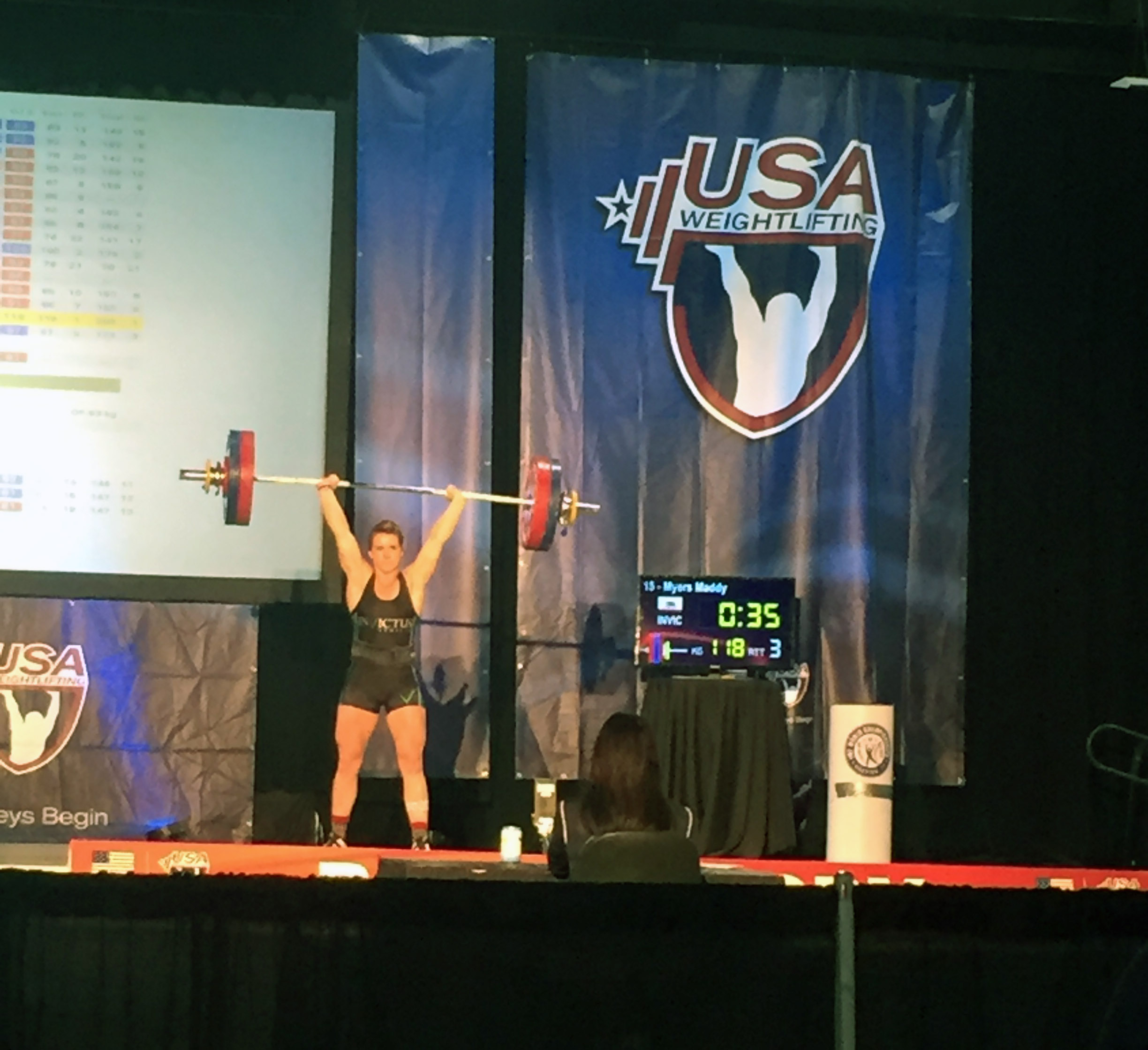
Maddy Myers and her record-breaking 118kg clean & jerk.
Most remarkable about Olympic weightlifting is its solitary nature, and how when a lifter is onstage in that Panopticon, surrounded by judges and refs and onlookers and photographers, they basically behave as if they are in their own little world. Everyone has their own mannerisms and routines. Some lifters seem to meditate before approaching the bar. Some have specific hand motions they do before each lift. Some clap their hands and even yell at the bar, as if to say, "do your worst!" Some lifters, when they finally raise the bar above their heads, will smile unabashedly -- one lifter even said "Oh my God, oh my God!" after nailing her best lift, laughing and ironically, looking almost weightless.
Celia told me that the actual act of lifting is over so fast that she often has no memory of what she was actually doing during competition. She could have described it in loftier terms, as a "transcendental experience" -- but to her: you pick it up, you put it down, and you're done. You only get one shot, really, since each of the six lifts you can attempt is its own singular moment. Maybe you mess up your arm, like Liv did. Maybe something suddenly doesn't feel quite right and you drop the bar instinctively, not quite remembering afterwards why you felt that that was the right thing to do. Maybe you're disappointed.
Or maybe you just kill it.
As Liv was icing her arm and digging in her backpack in the stands next to her family, getting ready to leave the Expo Center, a male lifter came up to her and just said, "Hey, you did a really good job." Liv looked up, and brightly said, "Oh, thank you!" It wasn't a larger conversation -- the boy just walked away. Moments like this seem commonplace in weightlifting. Everyone is encouraging everybody else. Liv didn't have a single successful lift that day, but a fellow lifter still made a point of telling her that she did well, that she competed. It's true that in weightlifting that you can seemingly blow it in a fraction of a second, but there are so many other fractions of a second involved where you were working hard, where you did everything right, where you fought through pain and pushed yourself.
Liv's emotion at injuring her arm and failing to complete her snatch wasn't shameful. She showed up. She worked hard. She did her job. Next time will be better. "Liv's a great lifter," everyone told me. I was sorry to have seen her on a bad day.
You can't do any sport without cooperating and having relationships -- even in solitary efforts like lifting, you need coaches, training buddies, and support systems. Celia and her coach Michael make a great pair; Michael is softspoken and pointed, and has a way of making you do what he wants with a hand gesture or a look. For example, Celia does what Michael tells her to do in warmups both quickly and enthusiastically. And Celia has a great cheering section in the form of her parents and other family.
Alyssa's philosophy on coaching and supporting her daughter is beautiful in its simplicity: "I don't care if she wins or not, I just care that she's happy and that she feels good, and I don't want her to be devastated. And as a mother and as a coach, I'm never focused on the end result. I don't care if you break a record or if you win something, I care that you're happy and learning something from the experience."
But, as Alyssa was quick to point out, this mindset pisses Celia off. She's not the sort of athlete who is satisfied with "just learning something" when you have to sit through over two hours of competition, often in a convention center in a strange town, after months of training, all coming down to just a few combined minutes of actual lifting. To go through what competitive lifters go through, meeting goals for yourself is what makes the whole experience worth it. Of course, as evidenced by Liv's case, messing up is never the end of the world.
But having goals is what makes the sport, and there's an intense psychology involved as you dance around those goals, those numbers, those weights, and try to hit that sweet spot between focusing on the prize and making yourself crazy. If you're going to do it, you have to do it yourself. You are all alone up there.
"In your singlet!" Celia emphasizes. "In Olympic lifting, it's all you, and everybody's watching."
It may be over quickly -- but then you have to get ready to do it all over again.
(Photo credit: Ellen Miller/Lifting Life, via Alyssa Royse)
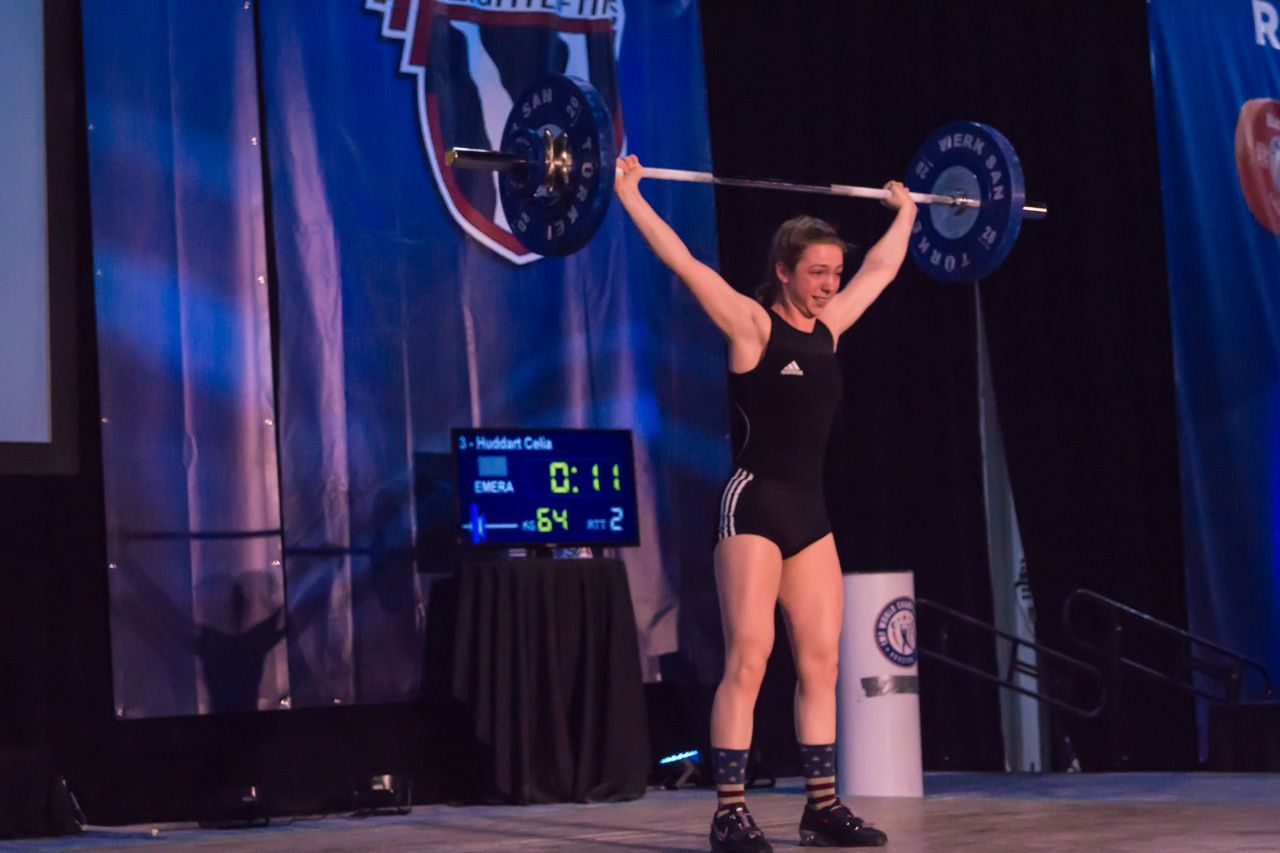

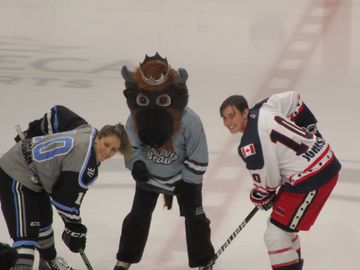
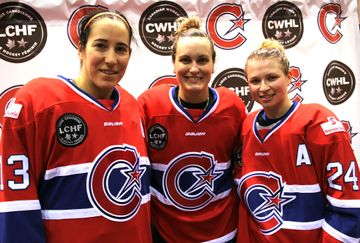
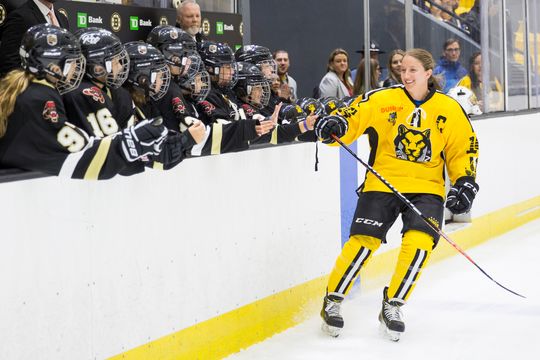
![The Post-Capitalist Sports Future: Sports Cryptocurrency Tokens are the Natural Conclusion of an Economy That Is About Nothing [PART 1]](/content/images/size/w540/2022/01/shubham-dhage-dVcXOkpp3fk-unsplash.jpg)
